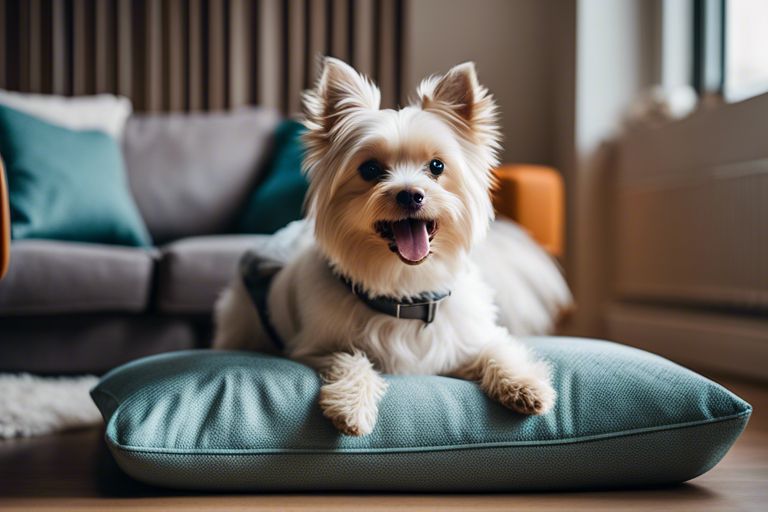Most pet owners living in apartments often wonder if small dog breeds are suitable for their living situation. While all dogs require proper care and attention, small dog breeds can actually be ideal companions for apartment dwellers. Their compact size and lower exercise needs make them well-suited for smaller living spaces. In this blog post, we will explore the benefits of having a small dog breed in an apartment setting and provide tips on how to ensure they lead a happy and fulfilling life despite the limited space.
Key Takeaways:
- Size Matters: Small dog breeds are generally better suited for apartment living due to their size. They require less space to move around and are easier to manage in smaller living spaces.
- Exercise Needs: While small dogs may not require as much space to roam, they still need regular exercise. It’s important to ensure they get sufficient physical activity either through walks or playtime indoors.
- Behavioral Considerations: Some small dog breeds can be prone to barking, which could be a concern in close living quarters. Training, socialization, and sufficient mental stimulation are key in addressing behavioral issues.
Characteristics of Small Dog Breeds
Size and Space Requirements
The size of small dog breeds makes them ideal for apartment living. They take up less space than larger breeds, making them more comfortable in smaller living quarters. While they still require regular exercise like all dogs, their need for space to roam is significantly less than that of their larger counterparts.
Behavior and Temperament
With the right training and socialization, small dog breeds can be well-suited for apartment living. They are often known for their loyalty, adaptability, and companionship. Small breeds like Chihuahuas, Dachshunds, and French Bulldogs are known for their affectionate nature towards their owners, making them great companions for apartment dwellers.
Behavior and temperament are crucial factors to consider when choosing a small dog for apartment living. Some small breeds have higher energy levels and may require more mental stimulation, while others are content with short walks and indoor play. Understanding the specific characteristics of the breed you choose can help ensure a harmonious living situation in an apartment setting.
The Benefits of Small Dog Breeds in Apartments
Adaptability to Smaller Spaces
There’s an inherent advantage to having a small dog breed in an apartment setting. These breeds are naturally well-suited to living in smaller spaces due to their compact size. They require less room to move around and are content lounging in a cozy corner, making them ideal companions for apartment dwellers.
Compatibility with Urban Lifestyles
Urban lifestyles can be busy and fast-paced, which is where small dog breeds shine. Urban environments often have limited outdoor space, making it convenient to have a small dog that doesn’t need as much room to exercise. Small breeds are also easier to transport in crowded city settings, whether it’s on public transportation or in elevators.
Smaller dog breeds tend to adapt well to the hustle and bustle of city life, making them great companions for city dwellers who are always on the go. Their size makes them more manageable in urban settings, and their adaptability to various living situations makes them a perfect fit for apartment living.

Considerations for Small Dog Breed Owners
Exercise and Mental Stimulation Needs
To ensure the well-being of your small dog breed in an apartment setting, it is important to provide adequate exercise and mental stimulation. Despite their size, small dogs can be energetic and require daily physical activity. Regular walks, playtime, and interactive toys can help meet their exercise needs and prevent boredom.
Noise Levels and Neighbor Considerations
Exercise caution when it comes to the noise levels of your small dog in an apartment setting. Barking can be a common issue, especially in small breeds that are prone to vocalization. To avoid disturbing your neighbors, consider training techniques to minimize excessive barking and be mindful of the time of day your dog is most active.
Another way to address noise concerns is by managing your small dog’s environment. Provide a comfortable and stimulating living space to keep them relaxed and less likely to exhibit nuisance barking behaviors. Additionally, consider discussing your dog’s behavior with your neighbors to address any potential concerns and foster a harmonious living environment for everyone.
Choosing the Right Small Dog Breed for Your Apartment
Research and Responsiveness to Training
Small dog breeds vary in their responsiveness to training, which is crucial for apartment living. Some breeds are more independent and stubborn, making training a challenge, while others are eager to please and pick up commands quickly. Consider researching the temperament and trainability of different small breeds to find one that fits well with your lifestyle and living situation.
Long-Term Commitment and Pet Care
When choosing a small dog breed for apartment living, it’s necessary to consider the long-term commitment and pet care required. While small breeds may seem low maintenance, they still need regular exercise, grooming, and veterinary care to thrive. Ensure you are prepared to provide the necessary care and attention for your furry companion throughout their lifespan.
Responsiveness to training is key when selecting a small dog breed for apartment living. Breeds that are responsive to training are more likely to adapt well to apartment rules and boundaries, making them easier to manage in a confined space. Look for breeds known for their intelligence and trainability to make the living arrangements more harmonious for both you and your pet.
Summing up
The decision to bring a small dog breed into your apartment requires careful consideration of various factors. While small dogs can be ideal for apartment living due to their size and lower exercise needs, their temperament, energy levels, and barking tendencies should also be taken into account. Proper training, exercise, mental stimulation, and socialization are key components to ensuring a harmonious relationship between small dogs and apartment living. With the right care and attention, small dog breeds can thrive in apartment environments, providing companionship and love to their owners.
FAQ
Q: Are small dog breeds suitable for apartment living?
A: Yes, small dog breeds are generally ideal for apartment living due to their compact size and lower exercise requirements.
Q: What are some benefits of having a small dog in an apartment?
A: Small dogs are more adaptable to smaller living spaces, easier to transport, and often require less exercise compared to larger breeds.
Q: How can I ensure a small dog breed is happy in an apartment?
A: To keep a small dog breed happy in an apartment, provide daily walks, mental stimulation through interactive toys, a comfortable living environment, and regular socialization with other dogs and people.

